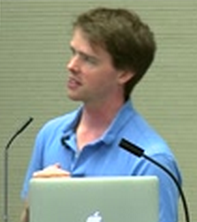Trees, tree models and treeviews in Qt
The first part in my series on writing applications with C++ using Qt and boost:
Trees, tree models and treeviews in Qt
by Jens Weller
From the article:
On Tuesday I've announced this new series, this is the first installment showing the progress. The first thing I did when I started to work on my new application, was to implement a generic tree class, that then is exposed through not so generic tree model to Qt. The QTreeView then simply displays the data in the tree. My goals are, that the class containing the tree it self, is independent from Qt. Yet as its used in Qt, there are a few design decisions which reflect the needs of the Qt Model View system...

 The call stack can be accessed without debugger too:
The call stack can be accessed without debugger too: More rapid-fire “now write this using lambdas” problem-solution drill with Sumant Tambe:
More rapid-fire “now write this using lambdas” problem-solution drill with Sumant Tambe: Have you registered for CppCon 2015 in September? Don’t delay –
Have you registered for CppCon 2015 in September? Don’t delay –  Have you registered for CppCon 2015 in September? Don’t delay –
Have you registered for CppCon 2015 in September? Don’t delay –  Have you registered for CppCon 2015 in September? Don’t delay –
Have you registered for CppCon 2015 in September? Don’t delay –  Have you registered for CppCon 2015 in September? Don’t delay –
Have you registered for CppCon 2015 in September? Don’t delay –